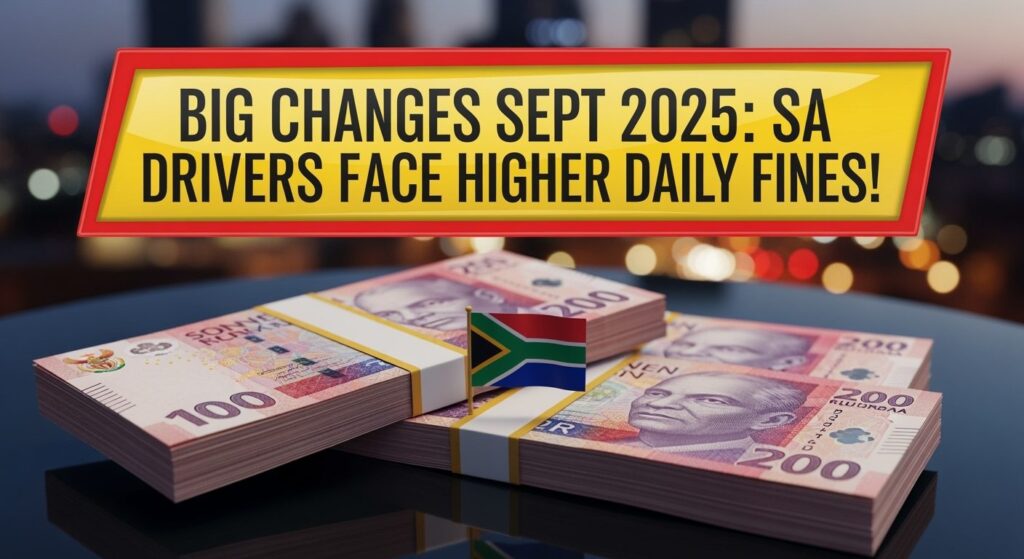South Africa Traffic Fines: I’ve been keeping a close eye on the upcoming changes to our road regulations, and it looks like South African drivers need to prepare their wallets. The new traffic rules set to take effect in September 2025 could significantly increase the financial burden on motorists who violate road regulations. If you’re a regular driver on South African roads, these changes will directly impact your pocket if you’re not careful. The government aims to improve road safety through stricter enforcement and higher penalties, but many are questioning whether increased fines are the most effective approach. Have you considered how these new regulations might affect your daily commute?

What Are The New Traffic Rules Coming in 2025?
The new traffic rules scheduled for September 2025 represent a substantial overhaul of South Africa’s current road regulations. At the core of these changes is a significant increase in daily fines for various traffic violations. Speeding fines will see the most dramatic rise, with penalties potentially doubling in some categories. Additionally, the rules introduce stricter enforcement mechanisms, including more roadside checkpoints and an expanded network of traffic cameras throughout major cities and highways.
Another key aspect of the new regulations is the implementation of a demerit point system that will work alongside the increased fines. Repeat offenders could face license suspensions more quickly under this system. The South Africa Traffic Fines structure will also include new categories of violations, particularly focusing on distracted driving such as mobile phone usage and other electronic device interactions while operating a vehicle.
Why Are Traffic Fines Increasing in South Africa?
The primary motivation behind these increased penalties is addressing South Africa’s concerning road safety statistics. Government officials have pointed to the country’s high rate of traffic-related fatalities as justification for the stricter measures. According to transportation department data, current fine levels haven’t been effective enough as deterrents, with many drivers simply factoring potential fines into their travel budgets rather than changing dangerous behaviors.
 Youth Support R12,500 Grant September 2025 – Young South Africans Can Apply From This Week
Youth Support R12,500 Grant September 2025 – Young South Africans Can Apply From This Week
Economic factors also play a role in this decision. The increased revenue from South Africa traffic fines will help fund infrastructure improvements and road safety programs that have faced budget constraints in recent years. Critics argue this creates a conflict of interest, where municipalities might become dependent on fine revenue rather than focusing purely on safety outcomes. However, proponents maintain that the primary goal remains reducing accidents and saving lives, with revenue generation being a secondary benefit.
How Will These Changes Affect Everyday Drivers?
For law-abiding drivers, the immediate impact may be minimal, but the margin for error becomes much smaller. A momentary lapse in attention that results in exceeding the speed limit could now come with a much steeper financial penalty. Commuters will need to be more vigilant about following traffic rules to avoid these increased fines. Navigation apps that alert drivers to speed limits and traffic cameras may become even more popular as drivers seek to avoid costly mistakes.
The changes will particularly affect professional drivers and delivery services, who spend more time on the road and consequently face higher statistical chances of incurring violations. These businesses may need to implement more rigorous driver training programs and possibly pass increased operational costs to consumers. For the average South African already dealing with rising living costs, these new traffic fines represent yet another potential financial stress point that requires careful navigation.
 R1,250 Foster Child Grant September 2025 – How to Apply Quickly and Avoid Delays This Month
R1,250 Foster Child Grant September 2025 – How to Apply Quickly and Avoid Delays This Month
When Should Drivers Start Preparing for These Changes?
Although September 2025 might seem distant, I recommend that drivers begin adjusting their habits now. Developing better driving practices takes time, and waiting until the new rules are enforced could prove costly. The transportation department has indicated they’ll be launching awareness campaigns in early 2025, but proactive drivers shouldn’t wait for official guidance to improve their road behavior.
Vehicle owners should also consider checking if their insurance policies cover traffic fines or offer any protection against the new penalties. Some insurers may begin offering specialized coverage options as the implementation date approaches. Additionally, now is an excellent time to invest in defensive driving courses, which not only help avoid fines but can sometimes qualify you for insurance discounts that might offset the potential cost of higher traffic fines.
Real-World Impact Assessment
I recently spoke with Johannes Mkhize, a taxi operator from Johannesburg, who expressed serious concerns about how these changes would affect his business. “With drivers making dozens of trips daily across busy urban areas, even minor infractions could add up to substantial amounts under the new fine structure,” he explained. Johannes estimates that his operating costs could increase by 15-20% if his drivers incur just one or two minor violations per week, potentially forcing him to raise fares for passengers who are already struggling with transportation costs.



